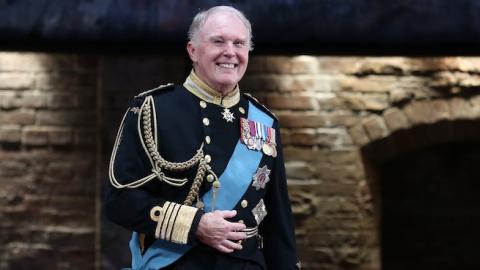Great Britain is being slowly inundated by a mass immigration that accelerated when Prime Minister Tony Blair sought a more diverse society. The arriving Muslim portion of this wave may make up more than 8 percent of the population within 14 years. The new Britons, far from assimilating, gravitate to separate communities where radicalism flourishes. The first National Day of Memory for Victims of Honor Killings took place this past July 15.
The Royal Navy now possesses 19 surface combatants, less than a third of the number that made up the fleet’s backbone during the 1982 Falklands War. Whether Britain will replace its sole nuclear deterrent, four aging nuclear-powered ballistic missile submarines, has become a political football. According to the BBC, as the result of a single-payer health care system all of Britain’s hospitals operate at a deficit. The question of a break-up with Scotland remains very much alive.
But policy wonkage is a weak draw for theater audiences. The recent Broadway hit Charles III is stronger stuff. The play stars Tim Pigott-Smith in the title role of the prospective King Charles III, who has ascended the throne after his mother’s death. Pigott-Smith is best known to American audiences for his role as the loathsome Indian policeman in Granada Television’s 1984 hit, The Jewel in the Crown, which aired on PBS. Pigott-Smith’s Jewel in the Crown performance segues cleanly into his role as Charles III. In the former, the imperial curtain is closing as India gains its independence. In the latter, the monarchy’s unraveling shows how the decay has migrated from the distant ruins of empire to Britain itself.
Queen Elizabeth II has died. Charles is king but has not yet been crowned. Parliament passes and sends him an Act that he believes wrongfully restricts freedom of the press. As monarch his assent is required, and this begins a quarrel.
The most famous monarch to quarrel with Parliament was his namesake, Charles I. This ended badly for the crown. The last English monarch to withhold her assent from a parliamentary desideratum was Queen Anne. Scotland and England had just been formally unified as Great Britain under a single parliament in 1707. At about the same time reports arrived that the French were about to invade Scotland. Parliament wanted to create and arm a Scottish militia. Anne thought this an imprudent time to create a standing military force in the Scottish wilds. She refused to sign the bill. It mattered not. The Queen reigned for another seven years, during which her great general, John Duke of Marlborough, Winston Churchill’s illustrious ancestor, trounced the French twice in major battles.
For the play’s Charles III a refusal to sign the bill Parliament has sent him matters a lot. The importance that the play’s king attaches to the bill is consistent with the real Charles’s interest in politics and society. The Prince of Wales has expressed himself on a host of issues. In 1984 he famously described a proposed addition to the National Gallery as “a monstrous carbuncle on the face of a much-loved and elegant friend.” Many architects were not amused. Charles weighed in 25 years later on the aesthetic merits of a proposed development at the former Chelsea Barracks in West London. Another dust-up with the architectural community followed. Several years earlier, when a Cumbrian farmer objected to Blair government policies noting that “if we as a group were black or gay we would not be victimized or picked on,” Charles sympathized in a private letter—subsequently leaked—to the Prime Minister.
So the play’s premise of a king who takes an active interest in the affairs of his realm is imaginable. It is not, however, original. A 1993 BBC production, To Play the King, offered viewers a similar perspective when a just-crowned king objects to Conservative Prime Minister Francis Urquhart’s policies. (This was the second part of the House of Cards trilogy whose tamer American version is now in its fourth season.) The threat of forced abdication hangs over the play and the BBC series alike.
Both Charles III and the Beeb’s 1993 series have been hits. Audiences on both sides of the Atlantic find the monarchy fascinating, not merely for its ceremony and occasional scandal but as a glittering contrast to the humdrum of democratic process in both countries.
Donald Trump, for example, taps into the public’s weariness with gray-faced elected officials. His wealth, and talent for parading it, lifts him above other politicians. His private Boeing 757 is not nearly the equal of the gilded coach that lumbered Queen Elizabeth to her Golden Jubilee in 2002, but the ostentation aims at the same impression of magnificence. The prospect that Trump offers, whether achievable or not, of solving national problems by virtual edict exudes the allure of power. It leaves the dross of governing by persuasion, compromise, and log-rolling on a dusty floor.
The production recognizes this in scenes where Charles appears in the full military regalia of a king. Shakespearean flourishes reinforce Charles’s kingliness. Much of the play is written in blank verse. “My life has been a ling’ring for the throne,” soliloquizes Charles, who reminds of Hamlet in his doubts about whether to sign or not to sign the obnoxious bill. The ghost of Diana flits in and out. The Duchess of Cambridge, plotting to put Charles aside in favor of her husband William, appears on stage with the strong odor of Lady Macbeth, but with zero interest in the perfume that Shakespeare’s villainess cried could not sweeten that little hand of hers.
This makes sense. Charles III faces a royal quandary. But his dilemma looks to be England’s. The set is gray and flat. It feels like a prison. The obstacles that keep the king from saying what he thinks hint of a society in which political correctness suffocates the spirit of liberty. The Prince Hal of Shakespeare’s play snaps out of dissoluteness. Nothing suggests that the play’s Prince Harry will. A street vendor slicing away at his gyros spells it out for Harry: “When,” he asks, “does Britain get so cut down that it’s not Britain anymore?”
It’s an uncomfortable question. The United Kingdom has been our closest ally and friend. The vendor’s question ought to remind American audiences that we face similar questions. In September of this past year the University of East Anglia prevented students from wearing sombreros distributed by a local Tex-Mex joint after the student union opined that wearing the hats might be seen as racist. Remind you of anything? Several weeks later a Tennessee university apologized over a photograph of its president wearing a sombrero at a Halloween party. The crossed tape over Charles’s mouth on the cover of the Playbill handed out to theater-goers spans the Atlantic. There’s as little good in this sharing as there is in the division between the United States and Britain of recent years.
Anglo-American relations are no longer what they were when the U.S. government provided logistical and intelligence support to British forces during the Falklands War. As one of its first acts, the current U.S. Administration returned a bust of Winston Churchill to the British embassy. More recently, in late 2015, the U.S. Trade Representative, in an attempt to influence British political will, suggested that if Britain were to exit the European Union it would face the same tariffs and barriers to trade as other nations not included in U.S. free-trade agreements.
This bit of political theater finds a proper echo in the play. Like the Shakespearean histories whose ghosts hover over the play’s language, action, and theatrical devices, the subject of Charles III is not merely the fate of a man but of a nation. The obvious difference is that Shakespeare’s kings ruled. Today’s British monarchs symbolize.
But symbols are not always mere. Queen Elizabeth has symbolized duty, character, hard work, dedication, and by the sheer length of her reign, perseverance. Her tenure has amplified the stability that characterized the England of her immediate ancestors.
The real Charles’s interest in an active public role pushes the one portrayed in the play to reflect on the loss of self that is the consequence of assenting to a bill he finds offensive. This sets the stage, literally, for a monarch who is searching for his own identity. In this sense, the figure in the play symbolizes the changes afoot in Britain—as well as the United States—as the people of both nations doubt their political and cultural roots, lean toward inchoate ideas of global citizenry, denigrate national interest as pre-modern, and place self-esteem on an altar that crushes free debate.
The real Charles may or may not hold some of these views. It doesn’t matter much because his—or any contemporary British monarch’s—ability to advance them is limited. He is a thoughtful and decent man who has had enough experience in public life to avoid the blunders of the play’s king. He will be a good king.




















